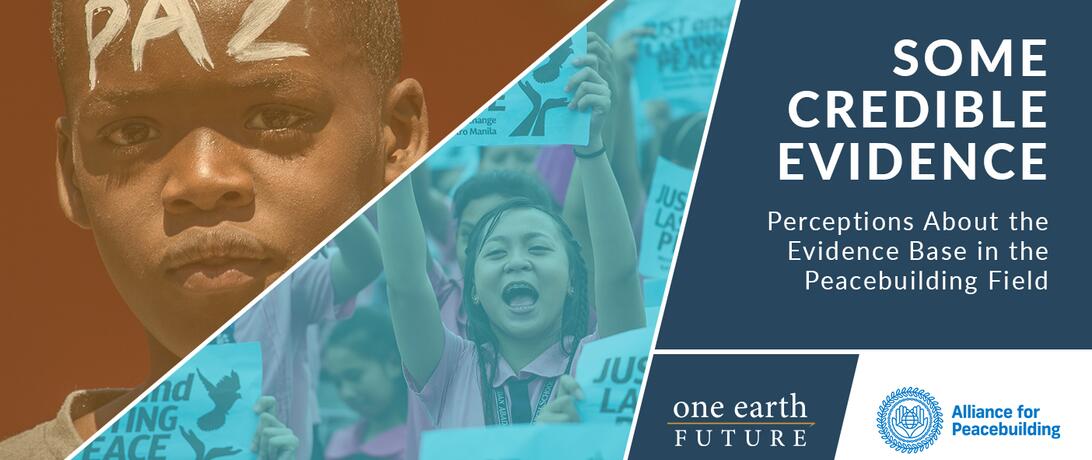
OEF and Alliance for Peacebuilding have released a new report analyzing the results of a wide-ranging survey of 207 international peace researchers, peace funders, and peacebuilders about their perspective on the evidence base around the results of international peacebuilding initiatives.
the Report
The report, entitled Some Credible Evidence: Perceptions about the Evidence Base in the Peacebuilding Field, presents the findings of the survey and discusses the implications for the field of practitioners and funders, including the need for a more broadly shared understanding about the evidence base for peacebuilding across different conflict types and the need for a better way to talk about rigor rather than research methods.
An increasing body of research is helping peacebuilders understand what works and what doesn’t, but debates about what kind of evidence is most useful and how evidence can be used are also becoming more common. In the face of this debate, it’s easy for peacebuilders to believe that there’s not a generally shared understanding about the evidence base in peacebuilding.
OEF and AfP solicited participants from across the peacebuilding field, and ended up with 207 participants including peace researchers, peace funders, peacebuilders, and people in government and the private sector. These participants were asked what evidence meant to them, what kind of evidence peacebuilding interventions needed, and what kind of evidence existed around what conditions support peace and what interventions worked to deliver these conditions. This survey finds that the peacebuilding field actually does have a widely shared and nuanced understanding of what kind of evidence exists, and concludes that the field has a strong evidence base describing what sustainable peace looks like. However, evidence for how to deliver this sustainable peace is lacking: the survey finds that very few interventions have significant evidence demonstrating that they are achieving their intended objectives.
Other Key Highlights from the Findings:
- The peacebuilding field has a widely-shared understanding about what kind of evidence is needed to support our work.
- The field agrees that we have strong evidence about what peace looks like. We know what’s needed for peace.
- The field also agrees that we largely don’t know how to do it: few of our interventions for delivering peace have M&E frameworks integrated behind them to measure and document sufficient evidence.
- Some interventions do have evidence: in particular, the field thinks we do have data that proves:
- How to deliver education in ways that support conflict prevention.
- How to increase women's engagement in economic and political life in ways that prevent conflict.
- Considering interventions to end conflict, only one - increasing women’s engagement in peace negotiations - was found to have strong evidence about how to do it.
- Other interventions the field sees as lacking in evidence. In particular, work in the domain of “preventing” or “combating” violent extremism lacks evidence showing it is important or effective.
- The field believes we need more evidence of all kinds supporting our impact. It also needs better ways of talking about evidence: participants felt that the debate about methods is less important than the idea that we need evidence.
Research authors are One Earth Future Foundation’s Conor Seyle and Sarah Heyborne, and Alliance for Peacebuilding’s Jessica Baumgardner-Zuzik and Shaziya DeYoung.
Supporting organizations to the project include Peace and Security Funders Group, Joan B. Kroc Institute for Peace and Justice at the University of San Diego, Peace Science Society, and the Better Evidence Project at George Mason University’s Carter School.
Alliance for Peacebuilding
With over 130 member organizations, AfP brings together the largest development organizations, most innovative academic institutions, and influential humanitarian and faith-based groups to harness collective action for peace. We build coalitions in key areas of strategy and policy to elevate the entire peacebuilding field, tackling issues too large for any one organization to address alone.
One Earth Future Foundation
One Earth Future (OEF) is an incubator of innovative peacebuilding programs, designing, testing and partnering to scale programs that work hand-in-hand with communities to eliminate the root causes of war. A private, non-profit operating foundation established in 2007 and operating from offices in Colorado, Colombia, Vienna, Somalia, and Washington, DC., OEF holds ECOSOC Special Consultative Status with the United Nations.
Article Details
Published
Topic
Program
Content Type
News